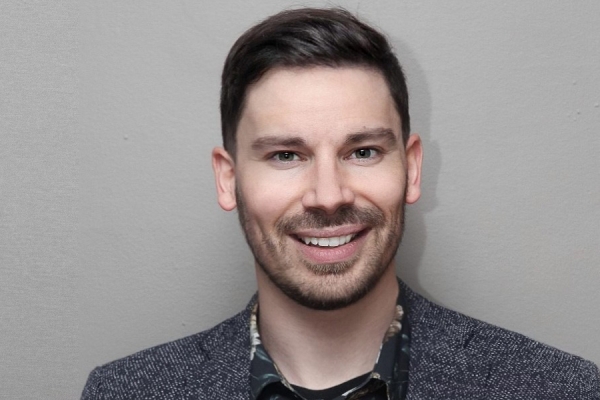 Kinesiology professor Nadia Azar, at right, collects data from sensors worn by Municipal Waste drummer Dave Witte. (Photo by Joe Orlando.)
Kinesiology professor Nadia Azar, at right, collects data from sensors worn by Municipal Waste drummer Dave Witte. (Photo by Joe Orlando.)
Drummers across North America and beyond are beating a path to Nadia Azar’s door.
A UWindsor kinesiology professor, Dr. Azar studies the physical demands of playing the drums. In addition to collecting data such as heart rate and energy expenditure during live performances, she studies musculoskeletal disorders in drummers.
Her latest research, funded through a recent grant from the Grammy Museum, will delve into the reasons why instructors do or don’t offer their students training about how to prevent playing-related injury.
“There’s definitely a demand for this type of research,” Azar said. “My goal is to do for drummers what sports science has done for athletes.”
Her project, awarded $20,000 U.S., will involve interviews with 30 drum instructors. The study, expected to take two years, is one of five scientific research projects funded by the Grammy Museum Grant Program this year.
Azar said she hopes her research will lead to the creation of training resources that can be incorporated into music lessons for drummers.
“Drum set educators play a vital role in promoting healthy behaviors in their students,” Azar said. Yet, she hypotheses based on her past research that few of them offer training in injury prevention.
While she will put out word of her research through the Percussive Arts Society, which has members around the globe, she doesn’t foresee having to beat the bushes for research subjects. Drummers find her.
More than 900 drummers from around the globe have participated in her past research projects.
Her interest in the biomechanics of drumming came to her one night in 2016 as she attended a concert by her favourite band, Dream Theatre.
As she watched drummer Mike Mangini bang away on his kit, she thought his movement and energy expenditure would make an interesting study.
She put that musing in a tweet. Mangini replied he’d be game, and a research project was born.
Azar soon found herself strapping monitors onto Mangini’s arms before his concerts to record his caloric expenditure. She did the same for The Tea Party’s Jeff Burrows, and others in rock, metal, pop, and country bands.
“Drummers saw their friends participate and they would message me, saying: ‘You’ve got to do me next’.”
She has established research relationships with drum equipment companies and publicizes her work through online platforms like Drumeo and Drum Talk TV.
Azar has been around drums for most of her life. Her husband and brother-in-law are drummers, as are two of her uncles. She learned the drums informally as a child and could play if pressed, but considers herself a rank amateur.
A UWindsor grad herself, Azar will use her project as a research opportunity for students in her Drummer Mechanics and Ergonomics Research lab, called the DRUMMER Lab for short.
“We hope to have an impact on the prevention of injuries in drummers,” she says.
The Grammy Museum Grant Program this year awarded $220,000 to 12 projects in North America. Five of the projects, including Azar’s, involve scientific research. Others involve music preservation and archiving.
Funded by the Recording Academy, the grant program, now in its 34th year, has awarded more than $7.7 million to music research and archival and preservation projects.
—Sarah Sacheli




